We are committed to the Joint United Nations Programme on HIV/AIDS (UNAIDS) aimed at accelerating the fight against HIV and ending the AIDS epidemic by 2030.
One of the top-line pathways towards meeting this goal includes the 95-95-95 treatment target:
During this period, one of the main defining moments in the company’s fight against this epidemic was the decision to rollout anti-retroviral therapy (ART) to its employees in 2002 as well as their dependents since 2008. This rejuvenated the HIV programme and changed the HIV narrative from one of despair to hope. In our lifetime, we can see the first HIV-free generation.
These initiatives are guided by the SDG framework, prioritising the SDG 3 goals which are relevant to each host community.
In South Africa, we support the delivery of the Coach Mpilo programme. This is a network of coaches providing men with peer-to-peer support to access treatment if they are living with HIV, while overcoming stigmas and stereotypes about HIV status. Men are also supported and encouraged to test for HIV and take steps to improve their holistic health and well-being.
In Zimbabwe, we are working with the Zvandiri and the Ministry of Health and Child Care and the National AIDS Commission supporting children and adolescents living with HIV to improve health outcomes through peers, family support and, health systems strengthening. Adolescents also receive support to test for HIV and access pre-exposure prophylaxis (PrEP) if HIV negative. Young mothers receive an enhanced package of support to ensure positive outcomes for themselves and their children.
In 2022, Anglo American and the Anglo American Foundation pledged $15 million to the Global Fund for AIDS, TB and Malaria as the anchor partner for the Digital Health Impact Accelerator Catalytic Fund. This fund will support countries across Africa to develop and implement digital health strategies, including electronic records, to improve community health provision and ensure that the right people can be reached with the right services at the right time. Other contributors for this initiative include Zenysis and Novartis Foundation.

Alanna Barros Vinhal
"Today, I’m 17 years old and after four years of being part of this project I can only see the benefits."
Alanna Kácia Barros Vinhal, 17 years old, volunteer at the Project "Vivendo a Adolescência com mais Saúde em Barro Alto" (Living the adolescence in a healthier way in Barro Alto) for four years
I've always liked to volunteer for the good of other people. So when the NGO Reprolatina – Innovative Solutions for Sexual and Reproductive Health – came to my school four years ago, there was no doubt in my mind that I wanted to participate in the project "Living adolescence in a healthier way in Barro Alto", sponsored by Anglo American.
I attended a presentation by the NGO at my school and when I realised the importance of the project, I signed up. I was in eighth grade, 13 years old, and I was selected as a volunteer. I participated in training and capacity building to better understand that sexual practice requires a lot of responsibility and seriousness.
Reprolatina, a partner of Anglo American, works in the municipality of Barro Alto (GO) and is focused on HIV/AIDS prevention, providing information to teenagers, to help them to make their own decisions, building life projects with more safety in terms of sexual and reproductive issues.
In one of my first activities as a volunteer, we created a box for anonymous questions for students seeking information on the subject but felt too embarrassed to ask directly. We would respond by placing answers on a wall. I was very surprised when I found out that many sexually active adolescents had never used a condom and were also unaware of contraceptive methods, I realised the topic of sex was still seen by many as taboo.
By facing such a lack of information and realising at the same time the high number of pregnant teenagers in Barro Alto, I felt a little discouraged and began to question the programme's effectiveness. "Is that going to work? How to change a reality of misinformation of this proportion?" Questions like these were part of the beginning of my journey as a volunteer. The answers to my questions soon came and I realised how we were taking information and training to young people who were unaware of any preventive methods.
In this project, every young person who receives the training and qualification becomes a multiplier of information and teaches other volunteers. With this, we can reach more people and build a culture of prevention in the region.
Today, I'm 17 years old and after four years of being part of this project I can only see the benefits. Benefits that mean teenagers, women and men are more responsible about sex and AIDS. Benefits that mean advancing women's empowerment. Benefits that mean being able to prove that the number of teenage pregnancies has fallen in the municipality of Barro Alto. And benefits that have resulted in the promotion of awareness that responsible sex should be a choice and a life goal. And even some personal benefits. Thanks to Reprolatina I lost my shyness and fear of public speaking. Today I currently give lectures and seminars in schools, health clinics and companies about my experience.
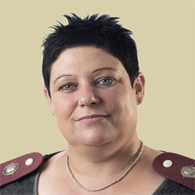
Alta Buys
This is more than just a clinic. It’s a legacy. I am proud of this.
Next year we will be 10.
Before we arrived, the people of this community would have to drive about 130kms to access treatment at the closest ARV accredited site. The nearest one was Kuruman hospital. The community really suffered. We brought a truly necessary service where before, there was nothing available.
I remember the day we were officially opened by the former premier of the Northern Cape, who also named our clinic. The Ulysses Gogi Modise Wellness Clinic salutes a great comrade from the apartheid years who also fought the fight against HIV and AIDS.
We started with only 13 members, now we have more than doubled to 30. Because we don’t just look after our immediate area, we provide services to mines within the greater Gamagara region. Olifantshoek, Deben, Dingleton, the Kathu Mapoteng area and Sishen. The service we offer actually affects many lives. Since the 1st of December 2007, the day we opened, we have never, ever run out of ARV treatment. And we have always had enough staff to look after our patients. We have been organised and resourceful. My hart is so vol trots vir dit.*Out here, really, it’s an achievement.
And we have been identified as one of the best practice models by SABCOHA.** Which shows that something is working. We are a public-private partnership between Anglo American’s Sishen mine, the Department of Health and our local municipality. It’s an exceptionally great support structure that has come together to lift our facility up so that we can take care of our community. Together we are driving the clinic because what this is, is really a community inheritance. And it’s busy being built, it’s part of what Anglo American wants to leave behind.
I have been here since the beginning.
I am very connected to this place. So is my family. This is more than just a clinic. It’s a legacy. I am proud of this. I am proud to be a part of this. Part of the agreement with the Department of Health is that no one in our community will ever have to pay to access the services offered at our clinic. No one. We will never turn anyone away. It doesn’t matter who you are, when you walk through these doors, you become our client. You are treated with dignity, care and respect. That’s what I love. That’s why I could never do anything else.
* Because of this, my heart is full of pride.
** South African Business Coalition on HIV/AIDS.
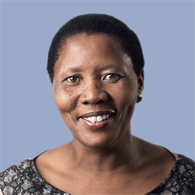
Kelelebetse Tlhabolo
I know my status, my family loves me, and I am living my life.
"Mama, you’re HIV positive."
I laughed and she asked me why I am laughing.
I told the health worker, "No, I am just laughing."
Then I said to her that she must give me hampers and qualify me for pension because that’s what I heard. She told me that there is no such story. I then said, "What are you saying?" and she said I should go back after three months and get tested again.
I never came back.
I realised that I was HIV positive in 2012 when I went for family planning. Then I went home and told my family that I came from the clinic and I was told that I am HIV positive. They thought I was joking.
I came here to look for a job and I continued to look for a job and I stayed, ignoring the fact that I had to go to the clinic. After some time I had the flu and I developed a sore. At the time I used to love beer. I went to the clinic in Tsholofelo and I met a lady. I told her that I have the flu and that I have developed a flu sore. I also toldthem that I have been told before that I have HIV. She said I should go to the other room so that I can get counselling. She gave me medication for flu and asked me to come back on Monday when she will give me a letter to take to UGM.
I went to UGM clinic. They did not check or run tests, they just gave me treatment, that was in 2012. Since then I would hear people say the treatment makes them sick and gives them a terrible headache and all sorts of things, but I have never experienced such. I haven’t even once felt sick or vomited, and that time I was taking treatment three times a day.
UGM helped me because when you are there you get to be attended to on time and you don’t stay long. You are warmly welcomed. We also get counselling. As old as Iam, I happened to skip two months without treatment. I lost weight. The sister took me to the counsellor. The counsellor advised me to never do what I did because I’ll take myself backwards instead of forwards.
Since I rented a room I had to tell the landlord. I explained my situation. Unfortunately, instead of her supporting me, she went to gossip about me with the other neighbour I happened to trust. The neighbour came to me and said, "The landlord says you have AIDS," and I said to her, "I don’t care because at least I know my status." She doesn’t know what’s killing her but at least I know my status, my family loves me, and I am living my life.
When I came here we were all infected women, but three passed on. Only I am still alive because I still take treatment and I am taking care of myself. In our support group, we meet every Tuesday at 5pm. It’s a soup kitchen where we volunteer. When we are here we give support to each other, we can be free to talk as a group. I don’t know where I would be without this clinic. What has been created here by Anglo American is something that is saving our lives. We are grateful.
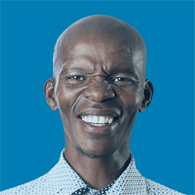
Obakeng Thukamelo
If a stone is thrown at me, I have the ability of turning it into something that will benefit me. Tswana Idiom.
I came to Kathu looking for a job.
Then I met the woman I am with now.
For a year this woman was using some tablets. She said they were for TB.
I told her I once had TB. These tablets are different. But I thought it was a new batch.
“TB takes six months. How come yours persists?” I said. “There is something you are hiding. You don’t want to tell me the truth.” They took her blood to check her CD4 count. They asked her, “Have you told him the truth?” They then told me that I had to come some other time to test. I told them that I could not do it that particular day because time was not on my side. We set an appointment and I found out that my blood is not well.
I didn’t blame her because I had the responsibility. I should have used a condom. I think because we had no child of our own she wanted us to make a baby.
I also thought she should have spoken.
People have advised me that we cannot be certain whose fault it is. As we have been living. My three children, each one has a different mother. I broke up with them permanently. As a man I happened to meet someone else even before I met her. That’s why I can’t blame her entirely. I accept everything I have been doing. This is our destination.
We are no longer playing.
We have children we have to look after.
In this clinic we are treated with respect. We are not spoken to in an offensive manner. That is what I am grateful for. Each time I come here that is how I am treated.
I came to terms with everything and decided to focus only on her.
I have nowhere to go. If I leave her it’s going to be a problem. She will look for another life on the side. Then the disease will spread. I decided to hold onto her.
We are on good terms now.
I have accepted. I accepted because I love her.
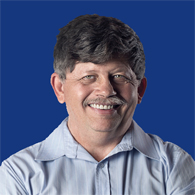
Dr. Lambertus Louw
My dream is that the stigma will disappear.
When we initially started treating patients for HIV in 2002, I remember one patient who said, "I’ve already buried my wife and I’ve bought my own casket now I am getting better, now what am I supposed to do with this thing?" He says he’s got a life now. He was planning for his own death and that turned his life around.
There’s several of these stories, several. When you see a patient who initially refused treatment and after even after cancelling – we decided that we were not going to let this person die. So we pressurised him to start. He started treatment at the weight of 43kg. A year later I was walking through the hospital and I saw this person sitting there, and I thought, this guy looks familiar, but I don’t recognise him. We started talking and then I looked at his file. It’s the same guy, now 73kg. He’s healthy and he’s still working for Anglo American.
When you are here in the Centre, you can see the difference, you make a difference. In that way I’m proud and I’m happy to be part of this facility. When you see that major impact on our patients and how we’ve changed the admission rate in our hospital. We’ve got a TB ward that’s almost empty now, where before we had a lot of TB patients. The admission of people who have HIV has decreased significantly. People have been going back to work, when before they were not able to.
Since we started at Highveld, we’ve seen major changes: positive change. Managing patients, quality of service, looking at where we’re going. It’s achieving what is essential for patients. For patient treatment, patient management and patient service. Service to the community, people who are dependent on what we do. I’ve experienced major progress in many ways, which is why we remain the leading facility when it comes to the treatment of patients with HIV and TB and we’re recognised for that internationally.
It’s essential for us that each person and their dependents know their status. If I publicly test, it will help those who are afraid to test. I’ve seen top management at Anglo American taking public tests then placing their photos on the system to show that they’ve been tested and know their status. That’s the drive and the HIV challenge that Anglo American has fully supported.
Because it makes sense: you want your people to be healthy, you want your people to be happy, to be able to be fully productive.
My dream will be that the stigma will disappear. That people will see this as any other normal chronic condition and that everybody will know their status and be informed enough to look after their health. That there would be support through all stages. But, it starts with the stigma. If we can take that away then HIV will be treated like a chronic disease: it will be seen as that and nothing more.
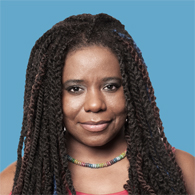
Sofia Carrillo
Ending HIV/AIDS, means ending stigma. Ending HIV/AIDS also means opening our eyes to the needs of the people.
My name is Sofia and I’m a Peruvian activist. I work to empower people through comprehensive sexual education. I work for change in public education policy, because I believe that with these changes, we can save lives.
In my country, as in many parts of the world, there is still racial and gender based discrimination. Progress has been made, yet we don’t speak about it enough to put an end to stigma. Furthermore, our public policy needs to better protect vulnerable populations and, particularly, the rights of the people living with HIV/AIDS.
As the coordinator of comprehensive sexual education projects at the Peruvian institute of Responsible parenthood, INPPARES, every day I fight to expose myths around gender, race and health. My job is to remove the blindfold from the eyes of policy makers for whom it is far too easy to forget about the vulnerable populations in our country.
In Peru, sexism and racism, are prevalent in everyday life. I have experienced it firsthand, and that is why I have chosen to work in INPPARES, where I can continue to demand protection for those living with HIV/AIDS, and work to increase prevention efforts and limit stigma and discrimination. I try to be the voice of those who have no voice.
In Peru, it is very complex to talk about HIV/AIDS, it is signal that women are one of the most vulnerable groups. Comprehensive sexual education is how I see that we can really put a stop to the epidemic.
But I cannot do it alone, this fight involves us all. That’s why our organizations promote comprehensive sexuality education in all stages of the life as a strategy to reduce the incidence and prevalence of the epidemic.
For 40 years, INPPARES has advocated for the full exercise of sexual and reproductive rights, without discrimination of any kind. Ten years ago, when we spearheaded the creation of the alliance for comprehensive sexuality education policies, this remains our goal. Certain populations and communities remain invisible to policy makers. We cannot tolerate this.
I want to contribute to change. But change will not be possible if we do not subvert our own prejudices, taboos, and phobias, and if we do not see each other as equal, despite our difference in terms of gender, sex, ethnicity and socio-economic class. Let’s banish our fears, and put our energy behind the exercise of our rights. Comprehensive sexual education is our chance.
* Yes! We can! (¡Sí Podemos!) receives support from International Women’s Health Coalition, one of Anglo American Group Foundation partner charities.
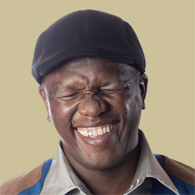
Percy Mathetwa
So it was a tough journey also to come and explain to my family, especially to my wife.
What I can say, firstly, it was a tough journey.
I was already married when I found out that I have HIV. And I didn’t expect such a thing would happen to my family. I even have a child infected by HIV. So I was expecting to lose my daughter because she was suffering a lot when she was growing up.
And now I could see that my wife also had signs and symptoms… It would be unfair to leave her not knowing the truth about what’s going on. So I needed to come and have counselling. I told her that tomorrow we’re going to see Dr. Masinga. He wants to see us, he’s our doctor who gave us that courage, but that day my friend, ay… we were sitting in this other room. The poor woman cried so much that I said, ay, I’ve put myself in a lot of trouble. You understand? It’s sad…
That’s when I started with treatment.
Ay buddy, I was taking those ‘smarties’ (ARVs). Ay, every day, these are my ‘smarties’, you see? Until I came here to Highveld Hospital and explained to them, “Ay, Dr. Masinga there’s a stress like this and this, my wife doesn’t know what’s happening and it’s her to time know what’s going on.”
When my wife knew the whole story, that’s when I felt relieved.
Before we left there she said, “I’ll accept the situation.”
Dr. Masinga, he motivated me and he changed my attitude and he gave me assignments of, “Look at your past and look at who you want to be in future. Having Nozipho and being a father of two kids who love you, and don’t forget your wife Nhlanhla, she’s beautiful my friend.” He would call me and say, “Ay my friend, you’re playing around. Look at Nozipho.” And Nozipho would sometimes say Dr. Masinga is her dad. Yes, she grew up in this clinic.
Back then, I was a walking candle. You see a candle? The size of a candle? But look at me now, you see me my friend? I just keep taking my ‘smarties’. If you could see my wife and child Nozipho: beautiful.
Now we are a happy family. We know each other, we support each other.
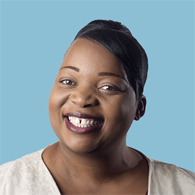
Zandile Mahlangu
You are like, this could be my child, you understand? This child doesn’t know anything, innocent as she is. It’s very draining.
Today a child can be diagnosed at six weeks old.
If the parent doesn’t know their status then we do the PCR. If the PCR is positive we give the child treatment for life.
You need to introduce treatment irrespective of what the CD4 count is saying, it doesn’t matter. We’ve got children who are teenagers, especially through Anglo American, that were diagnosed at six weeks and now they are teenagers and they are positive.
One client is thirteen years old. Born HIV positive. At the time this baby started the treatment she couldn’t talk, she couldn’t hear, she couldn’t eat, she had to depend on her parents, and now her parents are fighting. You can understand what is going on with the treatment. This child is unable to receive treatment, the child is malnourished, and the CD4 count has dropped to 3. As a health worker, you are there, representing the client. But at that point in time, the problem is, you can’t do anything, we ended up telling the parents, “Now we have to call child support.”
Obviously this child, by the time she’s twenty, she won’t be on any treatment. Already she’s on the second line with supplements. Sometimes it feels like you’re just pulling strings around, and at the end of the day, the parents don’t even understand that they did something wrong. But with Anglo American, we’re able to call on the family members. We can find you at work. When you come and clock in in the morning, then we can talk to you, we can trace you and say, “Father, why didn’t you bring your child for treatment?”
When a child comes into our clinic you are like, this could be my child, you understand? This child doesn’t know anything, innocent as she is. It’s very draining. Because even if you can understand exactly what the problem is, it’s still an unfolding story day by day. Today you find this, the next day you find that. At the end of the day, our main aim is to make sure our people are brought back to normal, good quality health. That’s what we’re here for. We want to see children healthy, living a good life.
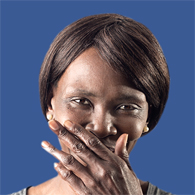
Matlakala Konsenki
“They wanted to know why I am so strong. I told them that it’s my faith and that you yourself must accept, you see.”
Most people don’t believe that HIV can be treated.
You and your family can accept, but it’s hard for other people to accept.
I have accepted that in everything, only God knows.
I started getting sick and I stayed with my children because I am a single mother.
I am the fourth born child. When I told them about my status, my siblings distanced themselves from me.
UGM gave me treatment as soon as I arrived from the doctor. I attended the clinic there and they arranged a social worker for me. They also gave me counselling and made sure that home-‐based care workers came to my place because I was weak and couldn’t travel. They would come and pick me up and all the time I would tell them that I wanted to go to the clinic. Their service was excellent. Till now I still use their services. UGM doesn’t discriminate, because you find white people, elderly people and children. It’s where we all go and where we find life. They give us tea, they pray with us – they are free, you understand? And they encourage us to be free.
I would like to say thank you for the lives of so many people. I wouldn’t be here if it wasn’t for Anglo American. Right now, other nations don’t receive the care we receive here. We receive an important care. It saved us.
My children have accepted my HIV status. They said, "Mama, you can go, you still remain our mother, as long as you’re alive." I went to the clinic with my second born to see the doctor. Before I left my boy called his principal and the principal arrived with his car to give me a ride. The principal was so heartbroken about my situation because they know that I am a single mother. They were asking themselves, "What will happen if I die?"
I have taken care of my mother and most people who passed away, I am the one who took care of them until their last breath. There was another woman who died; she used to live in the streets. I worked with another lady. I counselled her, helped her. There are people who are very stressed, they are not able to accept. In helping a person, you have to do it wholeheartedly.
I am thankful that my openness has helped a lot of people, they have accepted. Most of them were able to come to my house because they know that a lot of people have abandoned me; they wanted to know why I am so strong. I told them that it’s my faith and that you yourself must accept, you see?
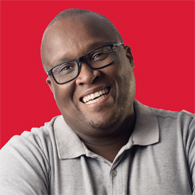
Letshego Lehone
People are starting to realise that HIV is here and it’s a human disease. It’s a human disease.
One of the things that has poked my heart is this thing of stigmatisation. You know, when a person is HIV positive and that person is afraid of another person knowing his or her status.
This one community member was afraid of people knowing and then this person was sick, very sick. They were supposed to go into the programme for medication. The viral load was too high, the immune system was too low. I was surprised to find out in two weeks that that person had passed away. That thing broke my heart. In a sense that the community we are living in can’t accept a person is HIV positive. And there are people who are HIV positive who actually can’t accept this themselves because there are people who will reject them. And it’s not a good thing. For me HIV is like any other disease, you understand? If you take your ARVs your body can come back. But now this thing of labelling people, making people feel uncomfortable with their HIV status is wrong. We must come now to a point where we start to support people.
When someone says they’re HIV positive and another person asks them, “Where did you get it from?” No. We are supposed to give that person support. We should not feel ashamed, you know? We must empathise not sympathise with that person. We should come to that point and understand that these are human beings, they are just like me and you. And even you are not immune to the virus. I can laugh at you today; tomorrow it’s me. You understand? We need to change our mindset, we need to approach HIV differently.
These are social illnesses that we have to deal with. But on a daily basis, it’s not an easy thing. You try to be honest with people when you talk. You need to be honest because with HIV you need to talk about it each and every day. You know, it needs to be our topic now as people, because people are avoiding that. They are avoiding talking about it.
People have this tendency to give disease or sickness a race: cancer for white people, HIV for black people. A disease is a disease. As long as you’ve got blood in your body, as long as you’ve got that heart or that liver or whatever, you can also get this disease. You understand? I believe as time goes on, people are starting to realise that HIV is here and it’s a human disease. It’s a human disease.
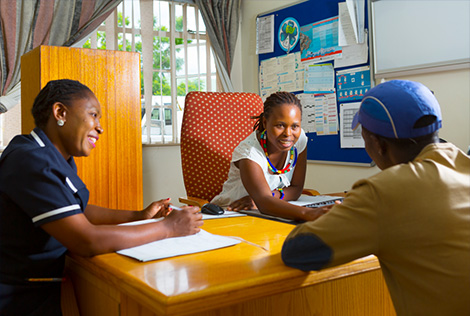
TB is the 13th leading cause of death worldwide and South Africa has the 8th highest TB incidence at a rate of 537 per 100 000 population per year.
Since 2018 we have reduced new TB cases among employees from 93 to 51 in 2022 and the incidence rate from 242 to 154 with no TB- related deaths since 2021.
Through people centered care, awareness and prevention, company policies and supportive systems, we can end TB.
What individuals can do
HIV and AIDS
Can we end AIDS?